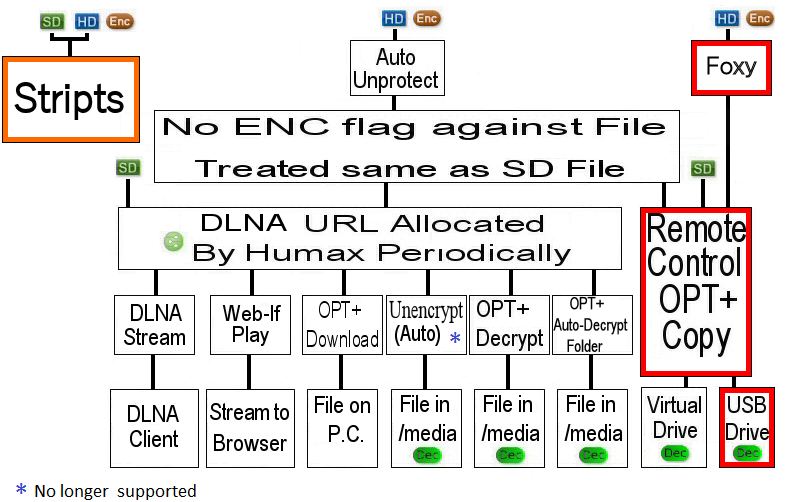Difference between revisions of "Encryption"
Ezra pound (talk | contribs) |
Ezra pound (talk | contribs) |
||
| (2 intermediate revisions by the same user not shown) | |||
| Line 18: | Line 18: | ||
*Recordings can be automatically decrypted in-place as a background task; | *Recordings can be automatically decrypted in-place as a background task; | ||
*Selected recordings can be decrypted in-place via the web interface; | *Selected recordings can be decrypted in-place via the web interface; | ||
| − | *The HDR software can be temporarily loaded onto the HD in order to decrypt recordings | + | *The HDR software can be temporarily loaded onto the HD in order to decrypt recordings [[Decrypt_recordings_on_the_HD-FOX_T2 | '''(See Notes)''']] |
| Line 30: | Line 30: | ||
*The [[FTP_Hi-Def_Content_Using_FOXY |'''FOXY''']] process only works via Remote Control OPT+ Copy | *The [[FTP_Hi-Def_Content_Using_FOXY |'''FOXY''']] process only works via Remote Control OPT+ Copy | ||
*Red boxes do not require Custom Firmware to be installed | *Red boxes do not require Custom Firmware to be installed | ||
| + | *Decryption via Stripts can be carried out on the Humax or on a stand alone platform using these packages [[Customised_Firmware_-_Features_Available#Miscellaneous_Software_Utilities | '''(Click HERE)''']] | ||
Latest revision as of 13:48, 17 July 2018
Some notes on recording encryption.
Stock firmware
- Every recording made by the Humax is encrypted before being stored on disk;
- The encryption key is unique to each box and believed to be stored in an on-chip Hardware Security Module (HSM);
- Copying a standard definition recording to an external disk (connected via USB) results in the Humax decrypting the file in the process [HDR model only];
- Copying a high definition recording to an external disk will NOT decrypt it;
- The HDR features a built-in FTP server but this only provides access to the raw files on disk. If you download files from the Humax via FTP, they will remain encrypted;
- The HDR features a built-in DLNA media server which serves decrypted content to DLNA clients. However, it will only stream high definition content to clients that negotiate Digital Transmission Content Protection (DTCP);
Custom firmware
If you install the custom firmware and install the right packages, then:
- High definition recordings can be treated in the same way as standard definition, i.e. decrypted on copy to external disk and streamed without DTCP;
- Decryption on copy can be achieved with a virtual disk (much faster);
- Recordings can be automatically decrypted in-place as a background task;
- Selected recordings can be decrypted in-place via the web interface;
- The HDR software can be temporarily loaded onto the HD in order to decrypt recordings (See Notes)
The steps required for decryption are detailed below:-
NOTES
- All Custom Firmware decryption requires DLNA to be enabled, Content Sharing must be turned on in the Humax menus (Menu >> Settings >> System >> Internet Settings)
- The Unencrypt (Auto) package only runs over night, Auto-Decrypt is now recommended as a replacement
- The DEC flag must be present if the Files are to be copied off the Humax via FTP, It is also required for other Custom Firmware functions such as :- Extract Audio, Extract to MPG etc.
- Auto-Unprotect MUST be used for DLNA decryption of Hi-Def. content
- The FOXY process only works via Remote Control OPT+ Copy
- Red boxes do not require Custom Firmware to be installed
- Decryption via Stripts can be carried out on the Humax or on a stand alone platform using these packages (Click HERE)
